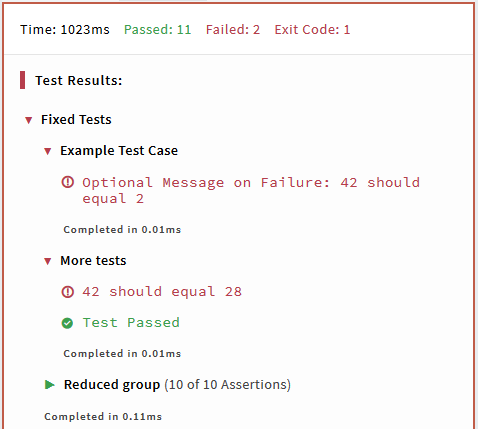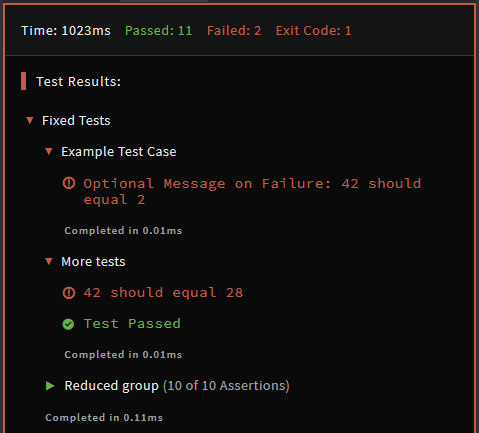Python Codewars Test Framework
To run Python tests, Codewars currently uses a custom test framework, published and available in this GitHub repository.
Overview
The test framework provides facilities to create named, hierarchical groups of tests, as well as individual test cases.
Additionally, the framework provides a set of functions performing assertions on various conditions: equality, error handling, truthness, etc.
Module codewars_test
All functions, decorators, and assertions provided by the framework are defined in codewars_test Python module.
Deprecation
The Python runner for versions prior to Python 3.8 does not contain the codewars_test module. The testing framework is imported implicitly and aliased as test and Test. This behavior is deprecated and for the Python 3.8 kata, the explicit import is required.
note
For simplicity, through the rest of this article it's assumed that the codewars_test module is imported and aliased as test with the following statement:
import codewars_test as testimport codewars_test as testThis is a convention used in many Python kata, but it's not a requirement, and authors can choose to import the module in any way they find suitable for them.
Organization of tests
Tests in the Python testing framework are composed of functions decorated with a set of Python decorators. All such functions are automatically discovered and run. The final result for every test block is determined by contained assertions and reported along with its measured execution time.
Test decorators call the functions immediately, so it's safe to use them in a loop.
Test groups: @test.describe
Functions decorated with @test.describe represent a group of logically related test cases.
@test.describe functions can contain more nested test groups (functions decorated with @test.describe) or individual test cases (functions decorated with @test.it, see below).
Test groups cannot contain assertions.
Test cases: @test.it
Functions decorated with @test.it represent a single test case. They can be defined inside of a function decorated with @test.describe, or can be top level functions.
@test.it functions can contain only assertions, and cannot nest other test cases or test groups.
Assertions
Assertions can be located only inside of a test case (a function decorated with @test.it). They must not be located directly under a test group (a function decorated with @test.describe), or in the top level of test.
Every assertion generates a separate log entry in the test output.
Note that failed assertions do not stop the execution of the enclosing test case by default. See Failing Early on how to control this behavior.
Example
The basic setup for the tests follows this example:
import codewars_test as test
@test.describe('Fixed Tests')
def example_tests():
@test.it('Example Test Case')
def example_test_case():
test.assert_equals(add(1, 1), 2, 'Optional Message on Failure')
@test.it("More tests")
def more():
for a,b,exp in [(-2,30,28), (42,0,42)]:
test.assert_equals(add(a,b), exp)
@test.it("Reduced group")
def more():
for v in range(10):
test.assert_equals(add(v,v), 2*v)
@test.describe('Random Tests')
def rnd_tests():
...import codewars_test as test
@test.describe('Fixed Tests')
def example_tests():
@test.it('Example Test Case')
def example_test_case():
test.assert_equals(add(1, 1), 2, 'Optional Message on Failure')
@test.it("More tests")
def more():
for a,b,exp in [(-2,30,28), (42,0,42)]:
test.assert_equals(add(a,b), exp)
@test.it("Reduced group")
def more():
for v in range(10):
test.assert_equals(add(v,v), 2*v)
@test.describe('Random Tests')
def rnd_tests():
...The above produces an output similar to the following:


Failing Early
Most assertion functions can accept a named argument allow_raise=False.
If you change its value to True, the tests contained inside the current block will be interrupted at the first failed test. The execution goes back to the parent block if it exists and the next part is executed.
Assertions
Equality tests
test.assert_equals(actual, expected, message=None, allow_raise=False)test.assert_equals(actual, expected, message=None, allow_raise=False)Checks that the actual value equals the expected value.
Note that because Python's equality operator checks for deep equality by default, you don't have to compare the contents of the array element by element yourself when you want to compare values as lists, tuples, sets, etc.
Default message is "\<actual> should equal \<expected>".
This function is usually the main building block of a Kata's test cases.
Non-equality tests
test.assert_not_equals(actual, expected, message=None, allow_raise=False)test.assert_not_equals(actual, expected, message=None, allow_raise=False)Checks that the actual value does not equal the (un)expected value. Default message is "\<actual> should not equal \<expected>".
Approximate equality tests
test.assert_approx_equals(actual, expected, margin=1e-9, message=None, allow_raise=False)test.assert_approx_equals(actual, expected, margin=1e-9, message=None, allow_raise=False)Checks if the actual value is close enough to the expected one, with a default relative or absolute value of margin. The comparison is performed like this:
div = max(abs(actual), abs(expected), 1)
is_good = abs((actual - expected) / div) < margindiv = max(abs(actual), abs(expected), 1)
is_good = abs((actual - expected) / div) < marginSo you can compare either big or small floating-point values without problems.
Default message is "\<actual> should be close to \<expected> with absolute or relative margin of \<margin>".
Truthness tests
test.expect(passed=None, message=None, allow_raise=False)test.expect(passed=None, message=None, allow_raise=False)Checks if the passed value is truthy. This function can be helpful when you test something which cannot be tested using other assertion functions.
However, since this function's default failure message is not very helpful, it's strongly advised to provide better, custom message.
Default message: "Value is not what was expected".
Pass and fail
test.pass_()
test.fail(message)test.pass_()
test.fail(message)Simply generates a passed or a failed test with a message. If your test method is very complicated or you need a special procedure to test something, these functions are probably a good choice.
Error tests
test.expect_error(message, function, exception=Exception)test.expect_error(message, function, exception=Exception)Checks whether invoked function throws an exception. Raised exception must be an instance of a type specified with exception argument.
The exception argument can specify a single type or a tuple of multiple exception types. The assertion is satisfied when the raised exception is an instance of at least one of the specified types.
Example
f=lambda: {}[0] # Raises KeyError, which is a subtype of LookupError and Exception
test.expect_error(msg, f) # Pass
test.expect_error(msg, f, LookupError) # Pass
test.expect_error(msg, f, OSError) # Fail
test.expect_error(msg, f, (OSError, KeyError)) # Passf=lambda: {}[0] # Raises KeyError, which is a subtype of LookupError and Exception
test.expect_error(msg, f) # Pass
test.expect_error(msg, f, LookupError) # Pass
test.expect_error(msg, f, OSError) # Fail
test.expect_error(msg, f, (OSError, KeyError)) # PassNo-error tests
test.expect_no_error(message, function, exception=BaseException)test.expect_no_error(message, function, exception=BaseException)Checks whether invoked function does not throw an exception of a type specified by exception.
The exception argument can specify a single type or tuple of multiple exception types. The assertion is satisfied when no exception is raised, or when the raised exception is not an instance of at least one of specified types. If during the execution of function an exception is raised that does not match the parameter exception, it is silenced and the test is considered passed.
Example
f=lambda: {}[0] # Raises KeyError, which is a subtype of LookupError and Exception
test.expect_no_error(msg, f) # Fail
test.expect_no_error(msg, f, LookupError) # Fail
test.expect_no_error(msg, f, OSError) # Passf=lambda: {}[0] # Raises KeyError, which is a subtype of LookupError and Exception
test.expect_no_error(msg, f) # Fail
test.expect_no_error(msg, f, LookupError) # Fail
test.expect_no_error(msg, f, OSError) # PassTimeout Utility
Runs a function decorated with @test.timeout within the time limit.
sec is the amount of time allowed. It is expressed in seconds and can be given as an integer or float.
Generates a failed assertion when the function fails to complete in time, and its execution is terminated immediately.
The decorated function is required to not throw any exceptions. If an error is raised during its execution, the test is considered failed and the error message becomes "Should not throw any exceptions inside timeout: \<Exception()>". This requirement is enforced by wrapping the inner function with expect_no_error, and as a side effect, one extra "test passed" entry is emitted for a collection of tests run inside a timeout wrapper.
warning
Timed tests should contain at least one assertion which verifies the result returned by the user solution. Otherwise, the test will be considered passed just if it happens to finish in time below the requested time limit, even if it would return an incorrect answer.
Example
@test.timeout(sec) # default message: Exceeded time limit of <sec> seconds
def some_function():
#do some heavy tests here...
for _ in ad_nauseam():
test.assert_equals(count_atoms_in_universe(), expected)@test.timeout(sec) # default message: Exceeded time limit of <sec> seconds
def some_function():
#do some heavy tests here...
for _ in ad_nauseam():
test.assert_equals(count_atoms_in_universe(), expected)Acknowledgements
v2 to support grouping tests with decorators was contributed by @Bubbler-4.